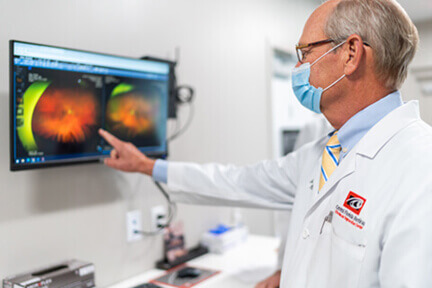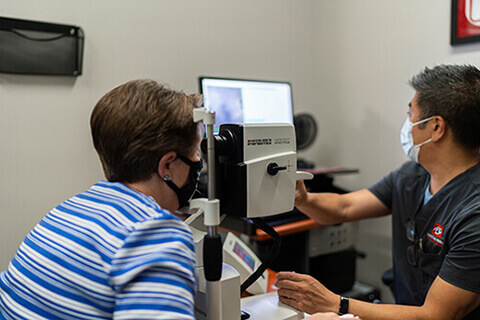Research
With over three decades of experience, Central Florida Retina is proud to be leading the way in the latest and most innovative treatments of retina and vitreous diseases.
Clinical Trials & You

What is A Clinical Trial?
A clinical trial is a research study in human volunteers to answer specific health questions. Carefully conducted clinical trials are the safest and fastest way to find treatments that work in people and new ways to improve health.
Who Should Consider Clinical Trials?
Some people participate in clinical trials because they have exhausted standard (approved) treatment options. These options either did not work for them or they were unable to tolerate certain side effects. Clinical trials may provide another option when standard therapy has failed.
How is a Clinical Trial Conducted?
An agreement form is provided to you and explains what the study involves. It is also reviewed with you by members of the research department. Being in a study is completely voluntary, and you can change your mind at any time even if you have already signed the consent form.

Contact The Research Department
For more info or to learn about how to enroll in one of our future studies, please fill out the form below. Thank you!
CFR Research Department
vbell@cfretina.com
800.255.7188
Current Clinical Trials

PROTOCOL AF– A Randomized Clinical Trial Evaluating Fenofibrate for Prevention of Diabetic Retinopathy Worsening
PROTOCOL GEN- Genetics in Retinal Disease Project
PROTOCOL AFA– Diabetic Retinopathy and Changes in Lipid Metabolism
Coming Soon!
PROTOCOL AP- A Randomized Clinical Trial Evaluating Combination Faricimab (Vabysmo) + PRP (laser) vs. Vitrectomy + Endolaser for Treatment of Proliferative Diabetic Retinopathy
Interest?
Contact the study coordinator (below) to find out more information.
Contact: Ginny Bell, CRC
Phone: 407-425-7188
Address: 3824 Oakwater Circle, Orlando, Florida 32806
Email: vbell@cfretina.com
Past Clinical Trials
Wet Age-Related Macular Degeneration
Coast Study (OPT-302)
A Phase 3, Multicentre, Double-masked, Randomised Study to Evaluate the Efficacy and Safety of Intravitreal OPT-302 in Combination with Aflibercept, Compared with Aflibercept Alone, in Participants with Neovascular Age-related Macular Degeneration (nAMD)
Regeneron
A Randomized, Double Masked, Active Controlled Phase III Study of the Efficacy, Safety, and Tolerability of Repeated Doses of Intravitreal VEGF Trap in Subjects with Neovascular Age-Related Macular Degeneration
Alcon
A Phase III study randomized, parallel-group, multicenter, double-masked study of the safety and efficacy of Anecortave Acetate for Depot Suspension (15mg and 30 mg) versus sham administration in arresting the progression of non-exudative (dry) AMD in patients who are at risk for progressing to exudative (wet) AMD.

Ophthotech
A Phase I Single Ascending Dose Trial To Establish The Safety, Tolerability And Pharmacokinetic Profile Of Intravitreous Injections Of E10030 (Anti-Pdgf Pegylated Aptamer) Monotherapy And Of E10030 Given In Combination With Lucentis 0.5mg/Eye In Subjects With Neovascular Age-Related Macular Degeneration
Sirion
A Phase II Multicenter, Randomized, Double-Masked, Placebo Controlled, Dose- Comparison Study of the Safety and Efficacy of Fenretinide in the Treatment of Geographic Atrophy in Subjects With Age-Related Macular Degeneration
Genentech & Novartis SAILOR
A Phase IIIB, Single-Masked, Multicenter, Randomized Study to Evaluate the Safety and Tolerability of Ranibizumab in Naïve and Previously Treated Subjects with Choroidal Neovascularization (CNV) Secondary to Age-Related Macular Degeneration (AMD)
VERTACL
A Phase II/III Multi-Center, Randomized, Clinical Trial to evaluate the Effects of Preservative-Free Triamcinolone Acetonide as an Adjunct to Photodynamic Therapy in Participants with neovascular Age-Related Macular Degeneration (AMD)
Genentech ANCHOR
A Phase IIIstudy which compares efficacy of subjects who have Lucentis®, injected into the eye once a month for two years, to PDT (Visudyne®), administered to the eye every three months for two years. in patients with wetAge-related Macular Degeneration (AMD)
Retinal Vein Occlusion
NEI (SCORE)
Two Randomized Trials to Compare the Efficacy and Safety of Intravitreal Injection(s) of Triamcinolone Acetonide with Standard Care to Treat Macular Edema: One for Central Retinal Vein Occlusion and One for Branch Retinal Vein Occlusion
Diabetic Macular Edema
Alimera (FAME)
A Randomized, Double-Masked, Parallel Group, Multi-Center, Dose-Finding Comparison of the Safety and Efficacy of ASI-001A 0.5 μg/day and ASI-001B 0.2 μg/day Fluocinolone Acetonide Intravitreal Inserts to Sham Injection in Subjects with Diabetic Macular Edema
DRCR Protocol AC
A Phase II study for evaluation of Anti-VEGF therapy, Bevacizumab (Avastin) Intravitreal injections in Subjects with Diabetic Macular Edema
Voyage Study
Long-Term Efficacy and Safety of Intravitreal Aflibercept Injections for the Treatment of Diabetic Retinopathy for Subjects who Completed the 2-Year PANORAMA Trial.



